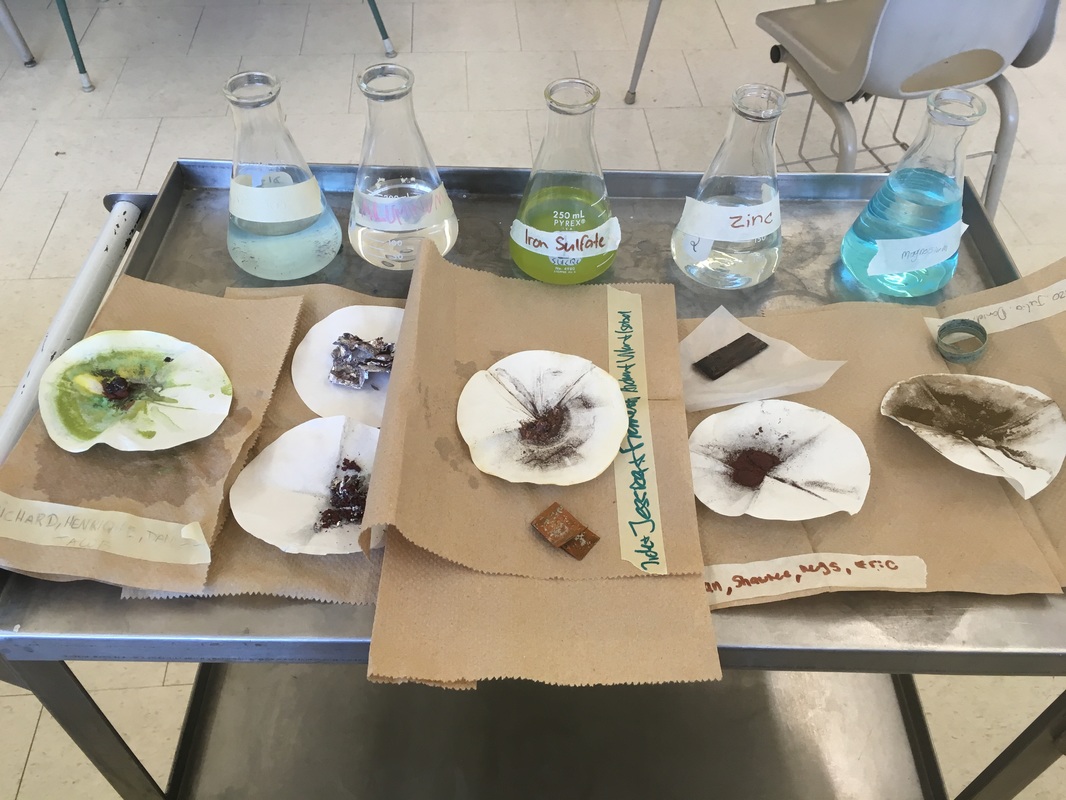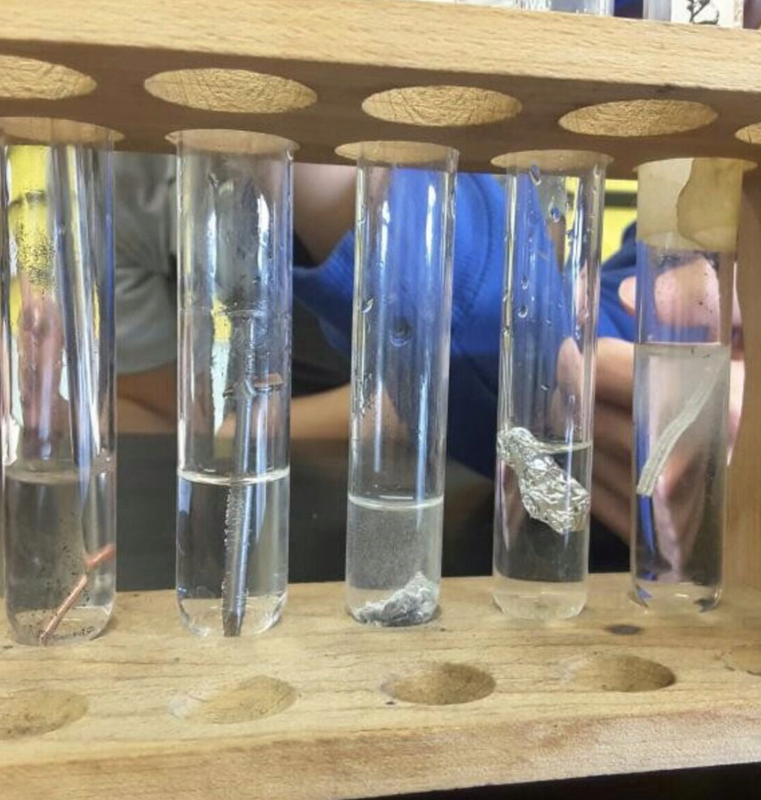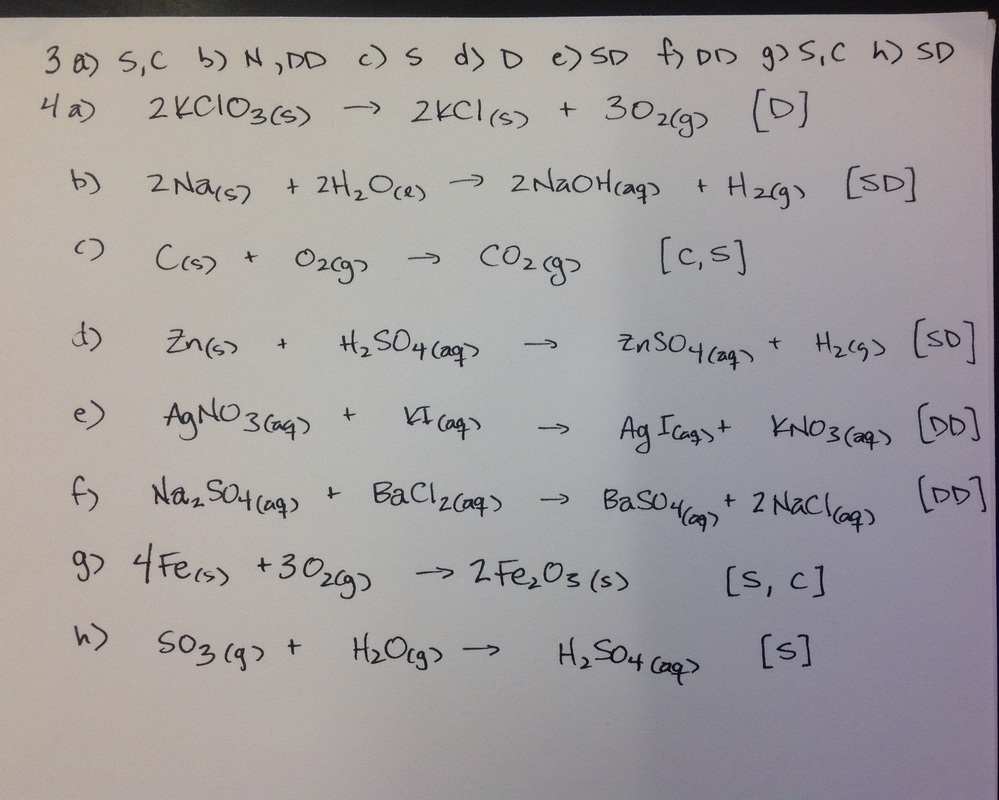Announcements
Friday, June 3
Here are the answers to 1-5 from the 4.1 Handout:
Thursday, June 2Complete Titration Lab handout from today!
Wednesday, June 1Hey all, won't be in class today, here's what you should be working on:
Tuesday, May 31Research the answer to the following questions:
1) Is air a solution? If so what is the solvent and what is the solute(s)? 2) What are some of the main pollutants in the air and where do they come from? 3) What are some of the main pollutants of indoor air (at home, school etc) and where do they come from? Also,
Monday, May 30Titration Introduction
Friday, May 274.5 Acids and Bases
Thursday, May 264.4 Dilutions
Wednesday, May 254.3 Tap Water and Concentration
Tuesday, May 244.3 Tap Water
Friday, May 204.2 Solubility
Thursday, May 194.1 The Power of Water
Wednesday, May 18Unit 3 Test
Tuesday, May 17Unit 3 Review: Unit Test Tomorrow!
Monday, May 163.6 Lab Day 2
Friday, May 13Unit 3 Lab - Lab report due next Friday
UNIT 3 TEST PUSHED BACK TO WEDNESDAY Thursday, May 12Prelab - Unit 3 Lab
Wednesday, May 113.6 Percent Yield
Tuesday, May 103.4-3.5 Quiz
Monday, May 93.4-3.5 Review (Practice quiz)
Friday, May 63.5 Limiting Reagents Day 2
Thursday, May 53.5 Limiting Reagents
Wednesday, May 43.4 Stoichiometry Part 2
Tuesday, May 33.3 Quiz and 3.4 Stoichiometry
Monday, May 23.1-3.3 Review
Thursday, April 283.3 Molar Concentration
Wednesday, April 273.1-3.2 Review
Tuesday, April 263.2 Molar Mass
Complete questions 1-4, A-C on the 3.2 worksheet Monday, April 253.1 Math Toolkit
Complete question 1 from front of handout. We'll discuss the rest tomorrow! Friday, April 22Unit 2 Test: Good luck!
Complete the 3.1 questions for homework Thursday, April 213.1 Counting Atoms
Here are the homework answers from Unit 2. Good luck on the studying for the unit 2 test tomorrow!
Wednesday, April 20Unit 2 Review (Test on Friday)
Tuesday, April 192.7 Neutralization
Monday, April 182.6 Combustion Review
Thursday, April 142.6 What is a flame?
Wednesday, April 132.6 Combustion Reactions
Tuesday, April 122.5 Double Displacement Reactions Day 2
Monday, April 112.5 Double Displacement Reactions
Friday, April 82.4 Single Displacement Reactions Lab
If you were absent for the lab, use the data below to complete it:
Observations:
Refer to image below (in the order above): Thursday, April 72.1-2.2 Quiz
Wednesday, April 62.3 Synthesis and Decomposition Reactions
Tuesday, April 52.2 Classifying Chemical Reactions (Day 2)
Monday, April 4In the library... please log in to google classroom (below) and work on your poster, which is due Wednesday.
Google Classroom Login Instructions 1. Go to google.tcdsb.ca/ 2. Sign in with your login (if required) 3. It should log you into your school board google drive. Use this to store and share files with other students and teachers. You can create google docs and spreadsheets here. Your files are accessible from any computer or device by logging in with google.tcdsb.ca 4. To get to google classroom, click the google apps button in the top right (the 9 squares) then click more. Click google classroom. 5. In google classroom, click the + and join a class. Our class code is cmaxhd6 6. Inside the classroom, you'll see the poster assignment. You can submit the assignment directly here! 7. If you prefer, you can also download the Google Classroom app. Your login info should be [email protected] with your password. The app allows you to easily see assignments and important dates, as well as ask questions and post interesting material. Friday, April 12.2 Classifying Chemical Reactions
Start on your Chemical Reaction Posters over the weekend (Due Wed) Here are your posters from today: Thursday, March 312.1 Did it React? Day 2
Wednesday, March 302.1 Did it React?
Tuesday, March 292.1 Balancing Chemical Reactions
Complete all balaning practice Thursday, March 24Unit 1 Test: Good Luck!
Wednesday, March 23Unit 1 Review
Tuesday, March 221.7 Into the Nucleus Presentations
Study for your Unit 1 Test on Thursday Here are the posters from today: Monday, March 211.7 Into the Nucleus
Wednesday, March 9Intermolecular Forces Day 2
Complete the table from the handout from toady if you haven't already. Catch up on any unfinished homework. Tuesday, March 8Intermolecular Forces
For homework complete the following questions: 1) Describe dipole-dipole forces, London dispersion force and hydrogen bonds and provide a diagram of each 2) Describe why water works as such a powerful solvent, able to dissolve a large variety of compounds. 3) Explain why water has such a high surface tension, able to climb the sides of a graduated cylinder 4) Rank the following types of bonds in order from weakest to strongest: dipole-dipole forces, hydrogen bonding, London dispersion force, covalent bonds, polar covalent bonds, ionic bonds 5) Which intermolecular force would be the most prevalent between the following molecules: CH4, NaCl, NH3 Monday, March 71.6 How does Soap Work?
Homework: complete bottom of handout from today: what causes water to behave like this? (Referring to the meniscus in a graduated cyllinder, water drops on a penny or a paperclip floating on water) Friday, March 41.6 Polarity
Complete page 84 #2-4 from your textbook Thursday, March 3Building Molecules
Wednesday, March 21.4 Nomenclature for Covalent Bonding
Do corrections for 1.3 Quiz Complete naming molecular compounds sheet from today. Here's a video that explains another method for drawing structural diagrams: Tues, Mar 11.4 Covalent Bonding
Complete questions on handout from yesterday Mon, Feb 291.2 Periodic Table Trends
Homework - Think about and answer the following: 1) Sodium explodes when it's added to water, and chlorine turns into an acid when added to water. Why is sodium chloride (salt) safe when added to water? 2) Why was the sodium chloride able to conduct electricity when added to the distilled water? Fri, Feb 26 Ionic Bonding Quiz (1.3)
What happens if you built a periodic table out of a 1L cube of each element? Here's an excerpt from the XKCD What If? comic we read: Feb 25, 2016Ionic Bonding Review
|
Course PreziCourse CalendarCourse Information
June 27 - Exam Review Day
June 24 - Exam Make-Up Day June 23 - Period D Exam June 22 - Period C Exam June 21 - Period B Exam June 20 - Period A Exam June 17 - Exam Review - Unit 4 June 16 - Exam Review - Unit 3 June 15 - Exam Review - Unit 2 June 14 - Exam Review - Unit 1 June 13 - ISU Due (exam review) June 10 - ISU Day 5 June 9 - ISU day 4 June 8 - ISU day 3 June 7 - Unit 4 Test June 6 - ISU day 2 June 3 - ISU day 1 June 2 - 4.6 Titration Investigation June 1 - Unit 4 Review May 31 - 4.7 Air Quality May 30 - 4.6 Titrations May 27 - 4.5 Acids and Bases May 26 - 4.4 Dilutions May 25 - 4.3 Concentrations May 24 - 4.3 Water Quality, Unit 3 Lab Due May 23 - No School - Victoria Day May 20 - 4.2 Solubility May 19 - 4.1 The Power of Water May 18 - Unit 3 Test May 17 - Unit 3 Review May 16 - Unit 3 Lab - Day 2 May 13 - Unit 3 Lab May 12 - Unit 3 Prelab May 11 - 3.6 Percent Yield May 10 - 3.4-3.5 Quiz, Unit 3 Prelab May 9 - 3.4 - 3.5 Review May 6 - 3.5 Limiting Reagents Day 2 May 5 - 3.5 Limiting Reagents May 4 - 3.4 Day 2 May 3 - 3.1-3.3 Quiz, 3.4 Stoichiometry May 2 - 3.1-3.3 Review April 29 - DA Day April 28 - 3.3 Molar Concentration April 27 - 3.1-3.2 Review April 26 - 3.2 Molar Mass April 25 - 3.1 Math Toolkit April 23 - Unit 2 Test April 22 - 3.1 Counting Atoms April 21 - Unit 2 Review April 19 - 2.7 Neutralization Reactions April 18 - 2.6 Combustion Review April 15 - PD Day (No School) April 14 - 2.6 What is a flame? April 13 - 2.6 Hydrocarbon Combustion April 12 - 2.5 Double Displacement Day 2 April 11 - 2.5 Double Displacement April 8 - 2.4 Single Displacement Reactions Lab April 7 - 2.1-2.2 Quiz April 6 - 2.3 Synthesis/Decomposition Reactions, Poster Due! April 5 - 2.2 Day 2 April 4 - Poster Work Period April 1 - 2.2 Classifying Chemical Reactions Mar 31 - 2.1 Did it React? Day 2 Mar 30 - 2.1 Did it React? Mar 29 - 2.1 Balancing Chemical Reactions Mar 28 - Easter Monday Mar 24 - Good Friday Mar 23 - Unit 1 Test Mar 22 - Unit 1 Review Mar 21 - Into the Nucleus Presentations Mar 20 - 1.7 Into the Nucleus Mar 13- 17 - March Break F Mar 11 - Science Fair T Mar 10 - 1.6 Ionic and Molecular Compounds W Mar 9 - 1.5 Intermolecular Forces Day 2 T Mar 8 - 1.5 Intermolecular Forces M Mar 7 - 1.5 Polarity Day 2 F Mar 4 - 1.5 Polarity T Mar 3 - Building Molecules W Mar 2 -1.4 Naming Molecular Compounds T Mar 1 -1.4 Covalent Bonds M Feb 29 - 1.2 Periodic Table Trends F Feb 26 - 1.3 Quiz (Ionic Bonding)/1.2 The Periodic Table T Feb 25 - 1.3 Ionic Bonding Review | ||||||||||||||||||||||||||||||||||||||||||||||||||||||||||||
Lukas Notten |






















